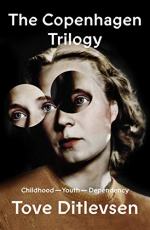|
This section contains 774 words (approx. 2 pages at 400 words per page) |

|
The Copenhagen Trilogy Summary & Study Guide Description
The Copenhagen Trilogy Summary & Study Guide includes comprehensive information and analysis to help you understand the book. This study guide contains the following sections:
This detailed literature summary also contains Quotes and a Free Quiz on The Copenhagen Trilogy by Tove Ditlevsen.
The following version of this book was used to create the guide: Ditlevsen, Tove. The Copenhagen Trilogy. Farrar, Straus and Giroux, 2020.
Tove Ditlevsen's The Copenhagen Trilogy is an assemblage of three short first person narratives, that trace Tove's life in Copenhagen, Denmark from girlhood through early adulthood.
In the first book, "Childhood," Tove lives with her mother, Alfrida, her father, Ditlev, and her older brother, Edvin, in a cramped apartment. Born the year the first world war ends, Tove's early life is relatively peaceful. However, her father is often out of work, and her mother is perpetually distracted. No matter how hard Tove tries to win her mother's attention and love, Alfrida treats her with coldness or hostility. Feeling alone and abandoned, Tove longs to meet someone who will authentically love and understand her. To ease her loneliness, she often retreats into her imagination. Sometimes she feels mysterious poetic rhythms consuming her whole mind and body. In these moments she feels pleasantly detached from reality. No one can hurt her, and even her mother's disapproval does not affect her.
When the new girl, Ruth, moves into the neighborhood, Tove is thrilled to have a friend. Spending time with Ruth distracts her from her disappointed relationship with her mother. Ruth's fearless and adventurous spirit also encourages Tove to do things she would never otherwise do. Meanwhile, Tove applies herself in school, gradually growing her love for reading and writing. Then, after a long bout of illness, Tove is devastated to discover Ruth has moved on. Tove increasingly retreats into her writing. Eventually, her brother discovers her poems and begins encouraging her to submit them for publication. Though Tove has felt perpetually trapped by her childhood, when she finishes middle school, she is overcome by sadness. She will now have to enter a world filled with strangers who will not understand her.
In the second book, "Youth," Tove holds her first job for only one day. After abandoning the nannying position, she finds another series of jobs, none of which please her. Her life becomes impossibly dreary. She wishes she could leave her parents’ home. She longs to publish her work. She wishes she had closer friendships. For a time, her relationship with Mr. Krogh, an elderly gentleman who lends her his books, quells her unrest. When Mr. Krogh disappears from her life, Tove's despair returns. She joins a theater group to pass the time, through which she befriends Nina. The two start going out every night, and dating incessantly. During one of these outings, Tove meets a young man who encourages her to submit to Viggo F. Møller's literary journal "Wild Wheat." Suddenly, Tove's hope is restored. She is even more enlivened when Viggo F. agrees to publish one of her pieces. The two begin a relationship shortly thereafter. Tove is convinced Viggo F. can give her the life she has always wanted.
In the third book, "Dependency," Tove realizes her marriage to Viggo F. has been a mistake. She no longer cares about his opinions on her writing, and even hides her new book project from him. The only way she can bear her life, is to retreat into writing. When a group of writers from "Wild Wheat" form a club, Tove's energies are restored. She is glad to have new writer friends, all of whom are younger than Viggo F. Through the group, she meets Piet and Nadja. She starts an affair with Piet, and decides to divorce Viggo F. Shortly thereafter, Piet leaves Tove. Nadja encourages her to join her friend group in order to overcome her heartbreak. Through Nadja's friends, Tove then meets and falls in love with Ebbe. When Tove gets pregnant, she and Ebbe decide to marry.
Though they are happy for a time, Tove soon grows restless again. Not even her writing can cure her dissatisfaction, nor the issues in her marriage. One night, she goes to a ball, gets drunk, and sleeps with a man named Carl. When she discovers she is pregnant, she becomes desperate to abort the baby. Carl performs the procedure, and gives Tove a painkiller, Demerol, to deal with the pain. Suddenly, Tove realizes if she can attach herself to Carl, she can have the drug whenever she wants. She leaves Ebbe, and eventually marries Carl. Throughout their marriage, Tove's reliance on narcotics worsens. Carl fuels her addiction. Finally realizing the direness of her situation, Tove contacts her psychiatrist and goes to rehab. Following her release, she continues struggling with addiction. After falling in love with and marrying Victor, she finds the support she needs to remain clean.
Read more from the Study Guide
|
This section contains 774 words (approx. 2 pages at 400 words per page) |

|



